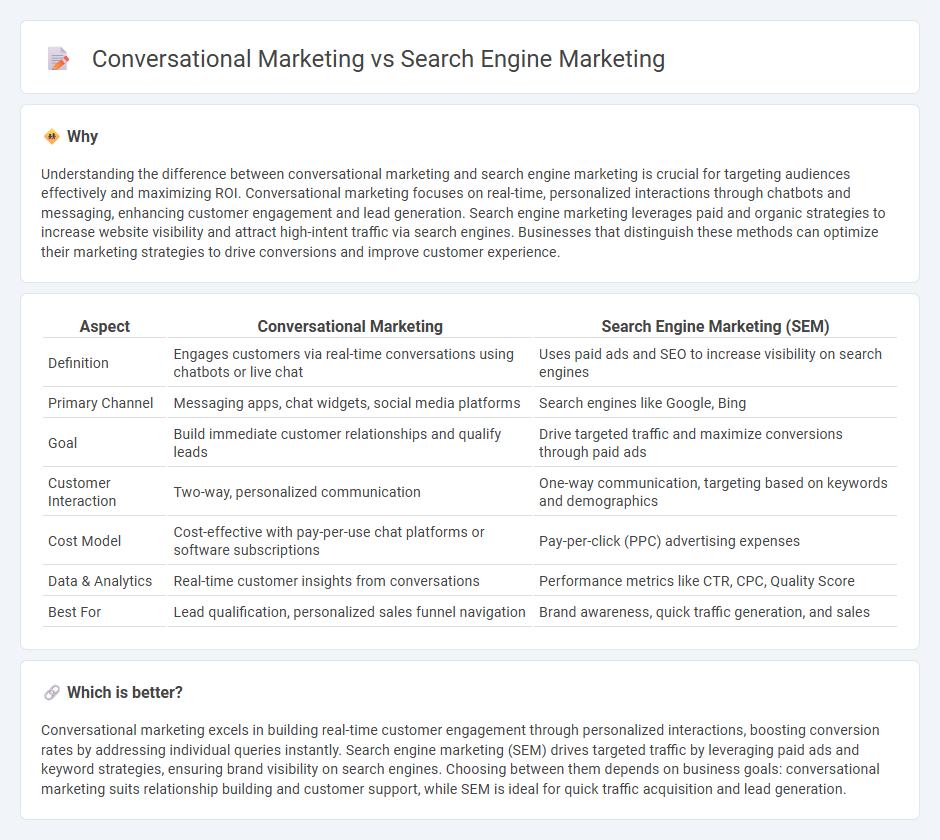
Conversational marketing engages customers through real-time, personalized interactions using chatbots or messaging apps, enhancing user experience and driving immediate conversions. Search engine marketing (SEM) targets potential customers by optimizing ads and content for search engines, increasing visibility and attracting high-intent traffic. Explore how these strategies compare and complement each other to elevate your marketing efforts.
Why it is important
Understanding the difference between conversational marketing and search engine marketing is crucial for targeting audiences effectively and maximizing ROI. Conversational marketing focuses on real-time, personalized interactions through chatbots and messaging, enhancing customer engagement and lead generation. Search engine marketing leverages paid and organic strategies to increase website visibility and attract high-intent traffic via search engines. Businesses that distinguish these methods can optimize their marketing strategies to drive conversions and improve customer experience.
Comparison Table
| Aspect | Conversational Marketing | Search Engine Marketing (SEM) |
|---|---|---|
| Definition | Engages customers via real-time conversations using chatbots or live chat | Uses paid ads and SEO to increase visibility on search engines |
| Primary Channel | Messaging apps, chat widgets, social media platforms | Search engines like Google, Bing |
| Goal | Build immediate customer relationships and qualify leads | Drive targeted traffic and maximize conversions through paid ads |
| Customer Interaction | Two-way, personalized communication | One-way communication, targeting based on keywords and demographics |
| Cost Model | Cost-effective with pay-per-use chat platforms or software subscriptions | Pay-per-click (PPC) advertising expenses |
| Data & Analytics | Real-time customer insights from conversations | Performance metrics like CTR, CPC, Quality Score |
| Best For | Lead qualification, personalized sales funnel navigation | Brand awareness, quick traffic generation, and sales |
Which is better?
Conversational marketing excels in building real-time customer engagement through personalized interactions, boosting conversion rates by addressing individual queries instantly. Search engine marketing (SEM) drives targeted traffic by leveraging paid ads and keyword strategies, ensuring brand visibility on search engines. Choosing between them depends on business goals: conversational marketing suits relationship building and customer support, while SEM is ideal for quick traffic acquisition and lead generation.
Connection
Conversational marketing enhances search engine marketing (SEM) by driving real-time customer interactions that increase user engagement and improve conversion rates on paid search campaigns. Integrating chatbots and live chat tools within SEM strategies helps capture qualified leads directly from search traffic, boosting return on ad spend (ROAS). Data collected through conversational marketing also refines keyword targeting and audience segmentation, optimizing SEM performance and relevancy.
Key Terms
**Search Engine Marketing:**
Search engine marketing (SEM) leverages paid advertising and keyword targeting to increase a website's visibility on search engine results pages (SERPs), driving highly intent-driven traffic and boosting conversions. By combining strategies like pay-per-click (PPC), cost-per-click (CPC) bidding, and ad ranking optimization, SEM delivers measurable ROI through precise targeting and analytics. Explore how integrating advanced SEM techniques can transform your digital marketing performance.
Pay-Per-Click (PPC)
Pay-Per-Click (PPC) in search engine marketing targets immediate visibility through paid ads on platforms like Google Ads, generating traffic based on keyword intent and budget control. Conversational marketing, leveraging AI chatbots and live chat, emphasizes real-time engagement, guiding users through personalized dialogues and improving lead conversion rates. Explore how integrating PPC with conversational marketing can maximize ROI and customer interaction efficiency.
Keywords
Search engine marketing (SEM) relies heavily on keyword targeting to capture user intent and drive traffic through paid ads on search engines like Google. Conversational marketing emphasizes real-time interactions using natural language processing to engage prospects directly, focusing less on traditional keywords and more on context and intent. Explore how optimizing keywords can enhance both SEM campaigns and conversational marketing strategies for maximum impact.
Source and External Links
What is search engine marketing (SEM)? - Search engine marketing is a digital strategy primarily focused on paid search advertising to increase website visibility in search engine results, offering immediate traffic and cost-efficient visitor acquisition through pay-per-click models.
What Is SEM? The Definitive Guide to Search Engine Marketing - SEM combines paid ads and search engine optimization to improve website visibility, drive targeted traffic, generate leads, and increase revenue by targeting keywords aligned with search intent.
Search Engine Marketing: What is SEM? Why is it Important? - SEM uses paid advertising to boost brand awareness and traffic by securing top positions in search results, leveraging strategies like PPC and contextual ads to optimize click-through rates and conversions.
 dowidth.com
dowidth.com